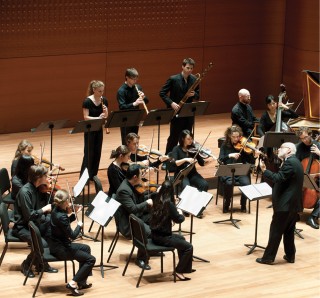Title

Ton Koopman, shown conducting Juilliard415 in 2011, returns this fall to lead the ensemble and musicians from the Royal Conservatoire of The Hague.
(Photo by Nan Melville)For the Historical Performance musicians, November marks the start of our preparations for a collaboration with Dutch conductor Ton Koopman and the Royal Conservatoire of The Hague. In November and December, we'll present Johann Sebastian Bach's Mass in B Minor in performances in Cambridge, Mass. (November 18); Alice Tully Hall (November 19); and Holland (December 4–11). But while we performers are generally most concerned with playing our parts and where we have to perform, sometimes we wonder how such a concert program got formulated. To find out, I talked to the director and administrative director of Historical Performance: Robert Mealy and Benjamin Sosland (MM '03, DMA '08, voice).
Body
The short answer is that Koopman first approached the Dutch school with the idea, and then, during the H.P. tour to the Utrecht Early Music Festival in the summer of 2015, Sosland met with Henk van der Meulen, the principal of The Hague, who proposed the collaboration. Once the proposition was set in stone, it was time to decide on the repertoire. The original idea was Bach's St. Matthew Passion, Mealy said, but Juilliard415 had already committed to a different tour in the spring, which would have been the only appropriate time to perform the work in Holland. (According to Mealy, the St. Matthew is performed in Holland during Holy Week as often as Handel's Messiah is here during Christmas.) Still, large-scale Bach seemed like the best option, and “choosing the B-Minor Mass allowed us to program it whenever we wanted,” Sosland said.
The collaboration between The Hague and Juilliard will be a new cultural experience for many of us. “For our students, this is a fantastic way to find out what their colleagues are up to in Europe, and for many of the European players, this is the first time they've worked with students trained in America.” Mealy said. “One of the really nice things about this collaboration is that the orchestra is totally half-and-half; each stand has one player from New York and one from Holland.” Administratively, the group will be handled by the staff in the respective country that we will be touring in, so all of us will experience how the other institution is run.
The collaboration also features a melding of the old and new establishments in Historical Performance. “The Hague practically invented historical performance education—the Conservatoire's early music program is something like 40 years old—and Juilliard's Historical Performance program, which was established in 2009, is a relatively recent development,” Sosland said. “Combining the youngest H.P. program with one of the most established ones will be really interesting.” The Hague is still one of the major centers for historical performance research today, and it produced many musicians that formed major historical performance ensembles in North America. In addition, “many Juilliard H.P. faculty members learned their art from teachers involved with that program,” Mealy said.
Creating learning experiences like that is part of what makes the Historical Performance program so engaging, and “that signature part of having concerts outside of Juilliard, whether in New Haven, Boston, or further afield won't change,” Sosland said. In fact, tours to India and New Zealand are also on the books for later this year, promising lots of musical decisions, logistical complexities, culture melding, learning experiences, 'and incredible memories for all of us.




